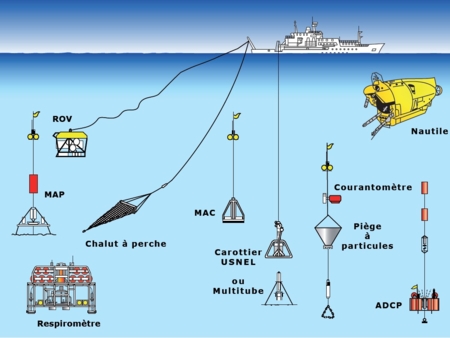Responses and adaptations of organisms
Theme leaders : Rémi Dulermo, Lénaïck Menot
Adaptation is a physical, chemical and/or behavioral characteristic that allows a species to survive in its environment. It can be described as a change or process of change by which a population becomes better adapted to its environment in terms of natural selection, through the acquisition of new genetic traits.
Response is the process by which an organism reacts to a stimulus, and is therefore rapid and reversible.
Thus, we try to understand how (a)biotic factors favor molecular (proteins...), genomic (genetic variations and phenotypic plasticity) and demographic (reproduction and/or differential gene flow, horizontal gene transfer, biogeography) evolutions allow the adaptation of life to, sometimes extreme conditions, the deep marine environments.
We are also investigating how deep-sea organisms cope with environmental stresses and we plan to decipher the molecular, metabolic and behavioral mechanisms involved in the response to natural and anthropogenic environmental changes.
In order to address the different issues of this theme, the unit can rely on different biological models such as:
- Holobionts (cold water corals, shrimps living near hydrothermal springs like Rimicaris exoculata)
- Microbial populations (e.g. Bacteria, Archaea and their associated mobile genetic elements (MGE))
- Prokaryotic model species (Thermococcus barophilus, Pyrococcus abyssi ...) to molecules (proteins, metabolites)
According to these cellular and molecular scales and the models of choice, we have dedicated and varied tools to answer our different scientific questions (Fermentation, Fish, metabarcoding, genetics, transcriptomics, proteomics, biophysics, in situ imaging ...).







